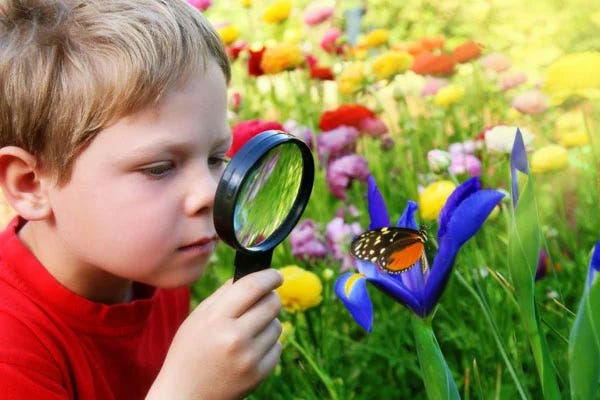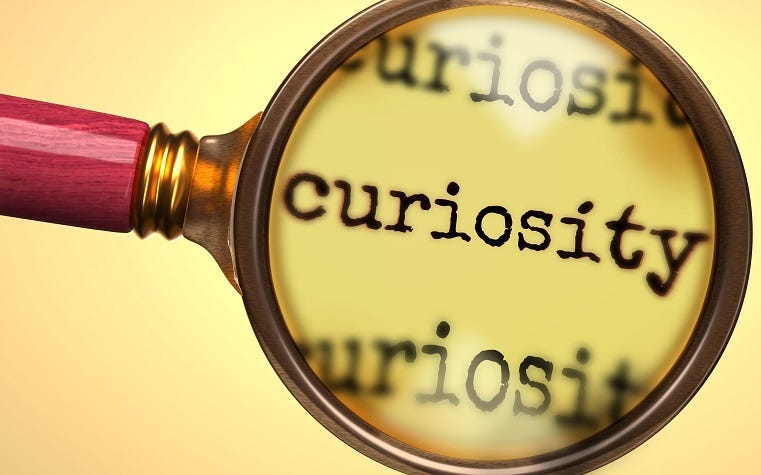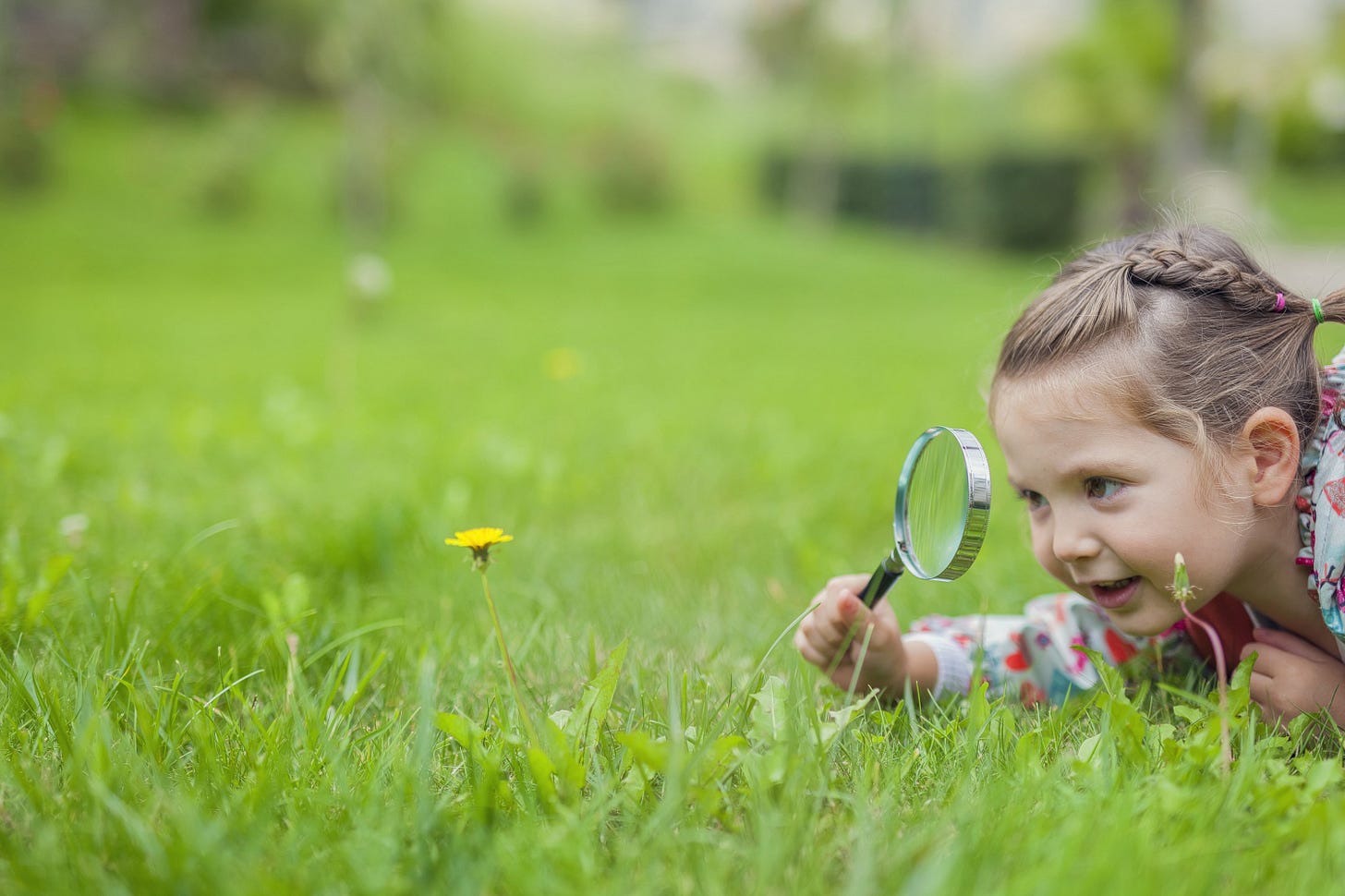This is not the same entry. It’s different. Keep reading!
I’ve polished this and I’ve finished it. Now it needs to marinate in me for a few days, giving time for all the spices and parts to come together as a whole. I’ve corrected as many typos as I could (thank you for not demanding I be perfect. If I had to be perfect on my Substack space, then it would shut me down. After all, if any of this gets published in future days ahead, then that’s what great editors are for). I’ve added my thoughts about curiosity and reduced this to really one point: All these texts point to one word—a word we need to recall, remember and practice in the days ahead. This is a message about “The Forgotten Virtue of Curiosity.” Here’s you’ll see below corrections, more thoughts fleshed out and a way I tried to thread the needle to stich together some words about a very important and much needed topic for us today’s confusing world.
“The Forgotten Virtue of Curiosity.”
Exodus 3:1-5
Psalm 105:4
Matthew16: 25-28
Romans 12:9-21
We prefer facts over curiosity!
It seems today, that everyone has such strong opinions—just about everything: Covid; the former President legal perils; Climate change, banning books and whether or not we can trust the news—any news. Facts have divided us and this division is apparent in the church as well—now with over 200 denominations—espousing a certain “rightness” and certainty over a belief system.
There is now a new disease that has plagued the minds and souls of so many of us both in the church and out of the church. It is the “Sin of Certainty.”
We know things. It is as if, we have exchanged the God-given and God-like virtue of curiosity and preferred certainty. Even Google shows that the word “curiosity” is on decline in our use of this God-given way of encountering the world. The word “curiosity” has been in steady decline in usage for the past 150 years in literature. That’s astounding to me.
How is it that as human beings, created in the image of God, that we are bartering to become like God and to become omnicient—posing like we know so much?
We know how to be successful and what success is? Even though the ladder you might be climbing to achiever success is leaning against the wrong wall.
We think we know how to live well and age well—even though the average life expectancy in this country is now shorter—younger —not older.
We know what we think about politics. Most of us are firm and fixed. It seems as if most of us are unwilling to change our minds or opinions when you look at current polls about the national election.
We know about doctrine and dogma. We have strong opinions about COVID; Climate Change and Currency.
We think that faith is about having certainty and living with absolutes than it is about embracing the wonder, mystery and delight of trust and uncertainty.
Faith, for some, is about enlisting in a combative army of sentinels—scouting for incorrect thinking and and becoming engrossed in whose right and whose wrong. There is a litmus test to tell us who’s in—who is out. Who is right. Who is wrong. Who the insiders are and who the outsiders are.
I once attended a class at a major, conservative, if not fundamentalist Bible school. The class was on “Why we believe in inerrancy” The entire class, in a post-graduate school setting, offering a Master’s degree was entirely indoctrination. The students were copiously taking notes, as scribes writing down everything the professors were telling them to believe. The students were being indoctrinated—not educated.
It’s all such arrogance and stands squarely in the face of our sacred text for today.
We’ve become so sure that we may be surely lost.
We’ve become so certain that we might as well take scissors to our sacred parchments and cut out famous texts which read: “The just shall live by faith.” Thomas Jefferson, cut out pages of the New Testament he didn’t like—perhaps we are doing the same thing right now.
The Invitation to Unlearn
Our sacred texts this morning offer an invitation to unlearn. They all about embracing questions; becoming curious and becoming seekers.
Contemporary writer, thinker and thelogian, Ann Lamott as said,
“The opposite of faith is not doubt— it is uncertainity.”
These texts come to the same conclusion that the poet Mary Oliver came to when she wrote:
Let me keep my distance, always, from those
who think they have the answers.
Let me keep company always with those who say
"Look!" and laugh in astonishment,
and bow their heads.”
These texts collectively come to the precise and exact same conclusion that Rilke did when he penned his famous lines about asking questions:
“Be patient toward all that is unsolved in your heart and try to love the questions themselves, like locked rooms and like books that are now written in a very foreign tongue. Do not now seek the answers, which cannot be given you because you would not be able to live them. And the point is, to live everything. Live the questions now. Perhaps you will then gradually, without noticing it, live along some distant day into the answer.”
― Rainer Maria Rilke
Somewhere along the way, we need to learn to ask the right questions if we want good and lasting answers. This is precisely what Moses teaches us; what the Psalmist teaches us and what Jesus teaches us. Marinated all together, these three texts provide fodder for the fire for the Apostle Paul to remind us that true religion is far, far more about being right and living in absolutes, it is about being deeply in love with one another.
From the pages of our sacred parchments, we see, over and over again that the deepest movement of the human souls is the movement from certainty to uncertainty. It is the journey of leaving the known for the unknown. It is the pilgrimage of faith—not fact.
Abraham and Sarah were invited to leave a land they knew for a future that was unknown. And from their day and age until our own, it seems God is more interested in cultivating a sacred curiosity in us rather than laying out the facts. Our plethora of questions about cancer; why bad things happen to good people; horrific accidents and catastrophes as well as the marvels of this world; the gift of human love and loyalty and the miracle of life all cause us to become like a modern day Moses and to take off our shoes and walk on sacred ground.
The spiritual life—-following Jesus—taking up the cross of Jesus is not a journey from point “A” to point “B.” It is a journey and in many respects, the journey is the destination.
Discipleship, also known as “Becoming Curious,” in the very words of Jesus, is about denying ourselves. We may have to deny our reason. WE may need to re-think somee things. We may need to re-define some things—which is what all of our Sacred Texts are suggesting.
Today, we are invited to examine our propensity to prefer facts over faith and to traffic more in logic than mystery.
Navigating the unknown is really the path of what it means to follow Jesus.
There is no “You Tube Video” for us to watch regarding how to navigate all the white-water of our world.
We do not follow a linear road in the shaping of our souls. Their are perilous valleys of the shadow of death. There are stormy seas where our life-boats get filled with water to the point that we often feel “sunk” in life. But, we also have our mountain-tops of transfiguration and epiphanies.
Rumi has reminded us—”As you start to walk out on the way, the way appears.” And the poet musician, Leonard Cohen wrote, “Not knowing where to go, I go to you. Not knowing where to turn, I turn to you. Not knowing how to speak, I speak to you. Not knowing what to hold, I bind myself to you. Having lost my way, I make my way to you.” (Book of Mercy #41).
One Jewish theologian, Rabbi Leib, penned these words, “The land of Israel represents a place where one sets aside one’s own will in favor of the divine will. In order to perceive the divine will, one must release all of one’s attachments and egoistic desires. Only then can the divine will be revealed to a person. And the deepest truth is that we must listen in or to receive that which is beyond our comprehension… to this end, we must continually surrender our conceptual knowledge—that which we understand with our minds alone.”
Isn’t this precisely the summation of our texts this morning? There are things in the spiritual life that the mind, alone cannot explain.
There is mystery. There is Spirit. There is a re-defining of our basic rules about what it means to human and to be Christian.
How do we become curious?
First, we must be willing to “un-learn” some things. Unlearning involves going back through our lives; our doctrine and our dogma to say, “We did the best we could to figure this out THEN, but now, more light, more wisdom; more insight has come and we see things differently now.
Perhaps this is precisely what the framers of the Constitution did when they wisely allowed for amendments. Some major issues written in 1776 just were not absolute, and final truth. The truth about Slaves. The truth about women just to name two issues.
We need to re-think some things and this is exactly what is at the root of the core question of Jesus—what can a person give in exchange for their soul?
This is a question that is very subversive—very layered and very, very important. It’s always been interesting to me that Jesus reserved his harshest and sharpest criticism for those on the religious right—the people who thought they knew everything.
This question makes us re-define success and all the gaining we’ve done in life. Somewhere along the way, we all must ask ourselves this question:
What have I lost by all my gaining?
Become curious about this question and you might just find a burning bush that will change the entire direction of one’s life.
I’ve faced this question when I was a mega-pastor at one of the largest churches of North Carolina. I was intoxicated on success. Addicted to my work and I was celebrated and affirmed in my drunken stupor of a life. I had to come to my senses the exact same way, the Prodigal Son had to come to “his senses”. Curiousity does that for a person—it helps us come to our senses—all of our senses to live a full and meaningful life.
Questions bring sobriety. Questions bring humility. Questions bring honesty and vulnerability. All the movements of Moses’ “turning aside” are similar to what Jesus must have intended when he told us to “Deny ourselves” if we really want to follow him. Denying ourselves just might mean learning a new math for your soul. I mean by “new math” that you come to a place in your life where things are just not adding up anymore.
You need to take your shoes off. You need to pick up a cross rather than a scepter and start over.
Becoming curious about our strategies for success.
Becoming curious about success being always, moving “Up and to the right.”
Becoming curious about looking inside ourselves—and getting to know who we really are without all of our diplomas, degrees and certifications.
Becoming curious about character and integrity—not just giftedness and charismatic personality.
Becoming curious about our busyness. The Chinese definition of busyness is “heart annihilation.”
Becoming curious about what living in a culture of violence is doing to us and to our children. Thomas Merton wrote “To allow oneself to be carried away by a multitude of conflicting concerns, to surrender to too many projects, to want to help everyone in everything is to succumb to violence.” Sit with that quote and talk about it over lunch and see curiosity could have it’s way with you inviting you to re-think a few things before it is too late.
Becoming curious about EGO. I define EGO this way: Edging God Out. This is precisely the deep concern of Jesus who seems to always be concerned with our obsessions of building our own kingdoms rather than collaborating in the Kingdom of God work. I love that Moses took his shoes off—it was a soulful admission—a mark of humility—to physically become “low” and “humble”. This is the posture where true education begins.
Cultivating Curiosity.
Choose to be slow. Dallas Willard has told us that “the secret to the spiritual life is to eradicate hurry. How then can we eradicate hurry in our lives and family life. Become curious about this.
Build time to reflect—to pause…to “Be still and know God.” This is what Sabbath is—a day of ceasing…stopping and reflecting.
Walk the Labyrinth—a beautiful exercise of letting go and unlearning as we move to the center and let go of all we’ve accumulated along the way—along the way to God and to prefer just “being” to “doing.”
Practice the Daily Examen— review of your day for 10 minutes using two terms: What was beautiful in my day? What was brutal in my day?
Make a choice to become curious in ways that you feel free to be curious.
As we close, may this be our prayer as we foster curiosity:
“Not knowing where to go, I go to you. Not knowing where to turn, I turn to you. Not knowing how to speak, I speak to you. Not knowing what to hold, I bind myself to you. Having lost my way, I make my way to you.” (Book of Mercy #41).







Steve, I think the most loving thing you could do for your audience is to say far less. I see you as being able to lead them in a slow reading of the Exodus passage and have them envision themselves looking at a burning bush that does not burn up. Trust that the spirit will give each one of your listeners, a vision of themselves and their relationship with God. Who knows, they might actually takeoff their shoes. But I believe this 12 minute homily lead in this way, would never be forgotten and just might be transformative.
As Tara would say, “Our wounding becomes our theology.” And probably our politics.🙃